There have been over 36,000 registered startups in India of which about 15,000 have got startup recognition. Out of these, 129 have got funding support. Most of these startups are in IT services with almost 15% followed by healthcare & life sciences with over 8%. Agriculture and food & beverages sector together account for less than 8%. Thus there is good scope for more startups in these sectors.
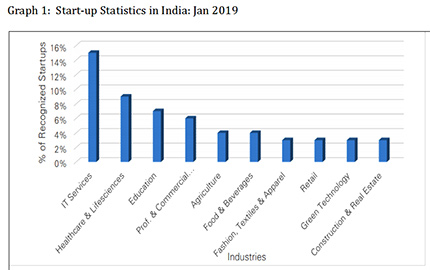
In the state-wise analysis, it is observed that most startups were in Maharashtra with over 2,500 followed by Karnataka, Delhi and Uttar Pradesh. Startups have been growing in number over the years.
In the year 2016, there were only 503 startups whereas these numbers grew substantially to 5,373 in 2017 and 8,724 in 2018.
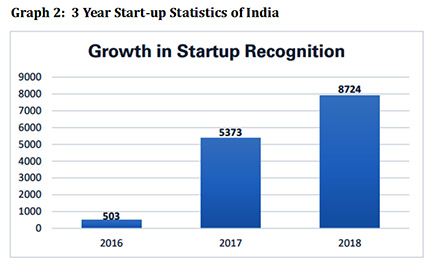
Components of Startup
A startup has five different basic components namely the entrepreneur getting (1) Unique Idea, (2) Finding Market or need for the idea, (3) Getting finance, (4) Finding the supply chain for the product and (5) Getting regulatory compliance. All these are different areas but work in unison to make the project successful.
Food Startup - Indian Scenario
With changing lifestyles and eating habits, food processing startups will only flourish in the coming days. India adds 1.5 crore to its population every year which is equivalent to three New Zealands or two Israels every year. There is a need for 4 billion meals in India every day so having a food startup is more desirable here.
Looking at the Indian food processing industry, only 25% of it is in the organised sector whereas 75% is small-scale of which 42% is unorganised and 33% is classified as small-scale industries. There is a constant change occurring of unorganised industry becoming organised.
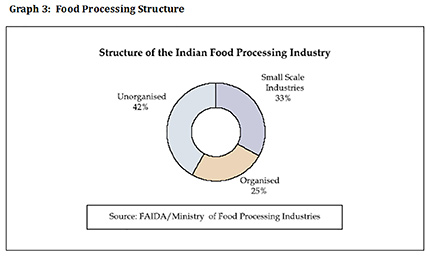
Major Trends seen in Food Startups
Private Labels, Change from Products to Services, Innovative Packaging that influences Purchase, and Sustainable Products
Trends in Consumption - Health-Consciousness (Low Sugar/Carb, High Protein, and Multi Grains); Natural, Organic & Fresh Produce; Cold Pressed Beverages, Global Cuisines; Ready-to-Cook or Ready-to-Eat Products; Review-based Ordering and Regional Tastes
There are also major trends seen in food delivery sectors such as E-Grocery, Restaurant Food Delivery, Food Kits, E-FMCG Food & Semi-Prepared Food.
Entrepreneurship & Innovation
Running a startup is like being in a horse race in which the product is a horse and the entrepreneur is a jockey whereas the market is the track. Entrepreneurs take on the risk of starting their own enterprise or invest in other startups.
Startup Ecosystem
For a startup to materialise there are many components necessary. There are support organisations, big companies and universities along with funding agencies, service providers and research organisations that make it possible for startups to begin. Many ideas, inventions and research can give a boost to startups which may be at different stages with entrepreneurs and startup team members trying to make the startup successful.
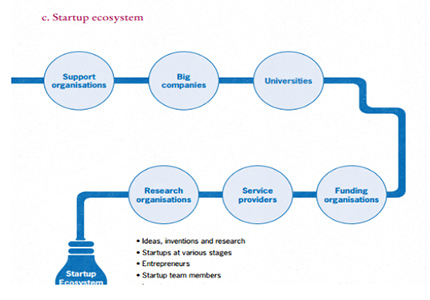
Startup Life Cycle
Just like a living organism, a startup has different stages of life. It starts with the discovery of a product or service that is scalable for a sufficiently large target market. The second stage is validation wherein the discovered product or service hits the market for initial consumers. This will give birth to the startup which enters into the next stage namely the maintenance where the benefits and problems faced due to global presence need to be addressed. The final stage is either the sale of the startup to a bigger giant or acquire huge resources for renewal or further growth of the startup to become a large company.
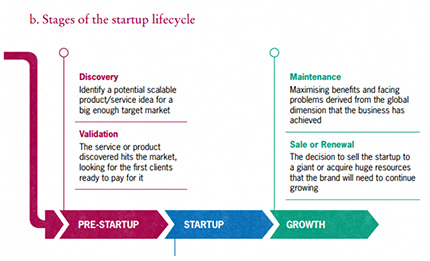
Modern Research & Development
It is essential for any startup to do a lot of research before getting into execution of the idea. The entire basis is to have the mindset of R&D keeping in mind the consumer perception throughout the process of bringing the startup into existence. While conducting R&D in food industry there are a couple of things to be remembered. One needs to take into consideration the Consumer for whom the product or service is targeted and the Technology used for food processing. To find out the consumer needs, one needs to carry out mapping of the consumers which may be conducted by carrying out a market survey.
Finance for Startups
- Any startup needs financing, which can have three stages in its lifecycle.
- First being funding by Angel Investors or Seed Funds required in the early stage. They invest solely into the entrepreneur with the innovative idea. Normally it does not bind the entrepreneur with any governance formalities.
- Venture Capital is the second stage of finance which is used to scale up the company’s proven business model. This comes from larger institutional funds. Here the focus is on building sales as well as establishing global presence. The final stage of financing is Public Markets which can be tapped by late stage startups which need to expand more aggressively or actively innovate the product. Public equity funds together with public markets provide large amounts of liquidity.
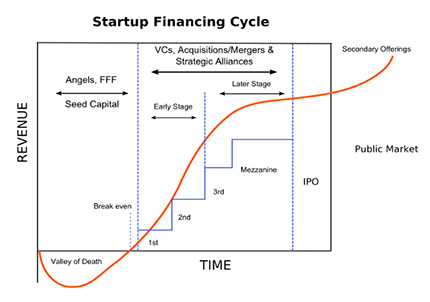
Finance can be raised through several sources including family and friends, banks and government schemes. There are crowd funding and Angel Investment options open as well as for the startup. One can also try Venture Capital (VC) from finance agencies.
In India, there are over 45 VC companies and most support IT startups. There are few that support agri and food space. Some VCs that support such startups are Omnivore, Villgro, Unitus Seed Fund, Ankur Capital, Infuse Ventures and Acumen.
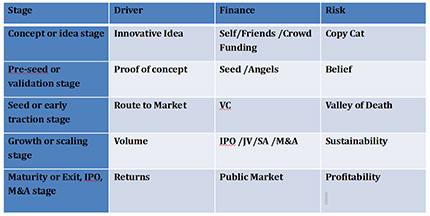
Start Up India is a flagship programme by the government and thus there are many schemes for supporting start-ups
Start Up India; Atal Innovation Mission (AIM); NewGen Innovation and Entrepreneurship Development Centre (NewGen IEDC); Dairy Entrepreneurship Development Scheme promoted by National Bank for Agriculture and Rural Development (NABARD); Venture Capital Finance Assistance (VCA) Scheme promoted by Small Farmers’ Agri-Business Consortium (SFAC); India Aspiration Fund.
FSSAI’s Contribution toward Startups
In conjunction with the Government’s initiative on ‘Start-Up India’ and ‘Digital India,’ FSSAI (Food Safety and Standards Authority of India) is bringing together innovators and start-up entrepreneurs to provide innovative solutions and transform the country’s food safety and nutrition landscape.
FSSAI has started project FINE: Food Innovator Network (https://fssai.gov.in/fine/) and also initiated the Fostac Plus course especially for startups. Through FINE, FSSAI is extending support to startups, giving one point help for accelerators, content partners, lab professionals, mentors, government schemes and so on.
AFSTI Support for Startups
Association of Food Scientists and Technologists of India (AFST [I]) is also supporting startups especially in Mumbai, Hyderabad, Chennai and Delhi where its chapters are creating good initiatives. Through AFST network, it is supporting over 250 startups and many AFST members are extending support without any cost.
Conclusion
To feed the 1.3 billion population of India, the food industry will play an important role and for bringing innovative and practical products and services, food startups are crucial for the country’s growth.
Though there are various schemes and support available for startups, strong ideas and persistent efforts are key drivers for a startup’s success.
(The author is past president AFST [I] and
chairman AIFPA Maharashtra.
He can be reached at prabodh1972@gmail.com)